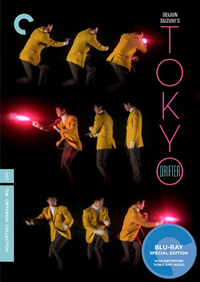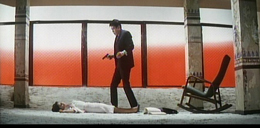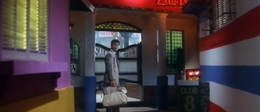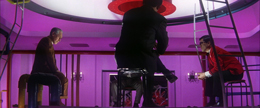Blu-ray Review of new Criterion Collection Disc from Seijun Suzuki
 Read the companion review of Seijun Suzuki’s Branded to Kill here.
Read the companion review of Seijun Suzuki’s Branded to Kill here.
Tokyo Drifter (1966)
Seijun Suzuki was employed by Nikkatsu (Japan’s oldest movie studio) in the 1950s and 60s, churning out B-movies at an alarming rate. On the new 2011 interview filmed for the Blu-ray reissue of Tokyo Drifter, he makes it pretty clear that his job was to keep chugging them out any way he could.
But around 1963, Suzuki grew bored with factory-like production and started making films that were a little left of center, no matter what kind of script he was given.
Critic Manohla Dargis says of these movies, “each [was] roiling with moments of pure delirium characterized by blasts of lurid color, goofball humor, helter-skelter angles and the director’s own barely restrained contempt for conformity.”
 In 1966, he got a script for an average yakuza film and was told to hire pop singer Tetsuya Watari, who would croon a corny number that was to be featured prominently in the movie. Rather than make a by-the-numbers film about a gangster trying to go straight, Seijun Suzuki made Tokyo Drifter, a colorful pop-art explosion full of primary-painted sets, abstract shapes, and all kinds of gleeful incongruities.
In 1966, he got a script for an average yakuza film and was told to hire pop singer Tetsuya Watari, who would croon a corny number that was to be featured prominently in the movie. Rather than make a by-the-numbers film about a gangster trying to go straight, Seijun Suzuki made Tokyo Drifter, a colorful pop-art explosion full of primary-painted sets, abstract shapes, and all kinds of gleeful incongruities.
The plot is pretty standard stuff: A young gangster tries to go straight and stay loyal, but is dragged back into the world of crime, kicking and screaming. Even at that, it gets pretty obtuse and the motivations of many characters seem to change at will. But that’s not why Tokyo Drifter is so much fun to watch.
 It’s the camera trickery and the playful art direction that send up the entire image of the badass yakuza to begin with. Why is Tetsuya Watari wearing a powder-blue suit? Why does it change to an all-white suit just as the background does? (Why does the actor seem to be sleepwalking through his role?)
It’s the camera trickery and the playful art direction that send up the entire image of the badass yakuza to begin with. Why is Tetsuya Watari wearing a powder-blue suit? Why does it change to an all-white suit just as the background does? (Why does the actor seem to be sleepwalking through his role?)
Tokyo Drifter was supposed to be another for-hire genre picture for Nikkatsu, but Seijun Suzuki had to do something to please himself. He probably thought the studio would appreciate all the extra effort he put into making an aesthetically modern and forward-looking film. They didn’t.
 It may be lightweight material, but Tokyo Drifter is overflowing with the sheer joy of moviemaking, and its the first of two Seijun Suzuki flicks that Criterion is reissuing on gorgeous Blu-ray.
It may be lightweight material, but Tokyo Drifter is overflowing with the sheer joy of moviemaking, and its the first of two Seijun Suzuki flicks that Criterion is reissuing on gorgeous Blu-ray.
Also included on the disc are new interviews with director Seijun Suzuki and assistant director Masami Kuzuu, an interview with Suzuki from 1997, the Tokyo Drifter trailer, and a booklet featuring an essay by film critic Howard Hampton.
Tomorrow we’ll look at the Criterion Blu-ray of the 1967 Seijun Suzuki movie Branded to Kill, which got him fired from Nikkatsu once and for all.









Comments on this entry are closed.